Ginkgo and rosemary team up to create a powerful brain-boosting tea. You'll benefit from ginkgo's ability to improve blood circulation to your brain, enhancing memory and concentration. Rosemary contributes compounds like rosmarinic acid and 1,8-cineole, which boost cognitive performance and protect against oxidative stress. Together, these herbs amplify each other's effects, leading to increased focus, better memory recall, and improved mental stamina. Regular consumption can help protect against age-related cognitive decline and may even alleviate symptoms of anxiety and depression. By incorporating this herbal blend into your daily routine, you'll access a wealth of cognitive benefits that can transform your mental clarity and performance.
Understanding Ginkgo and Rosemary
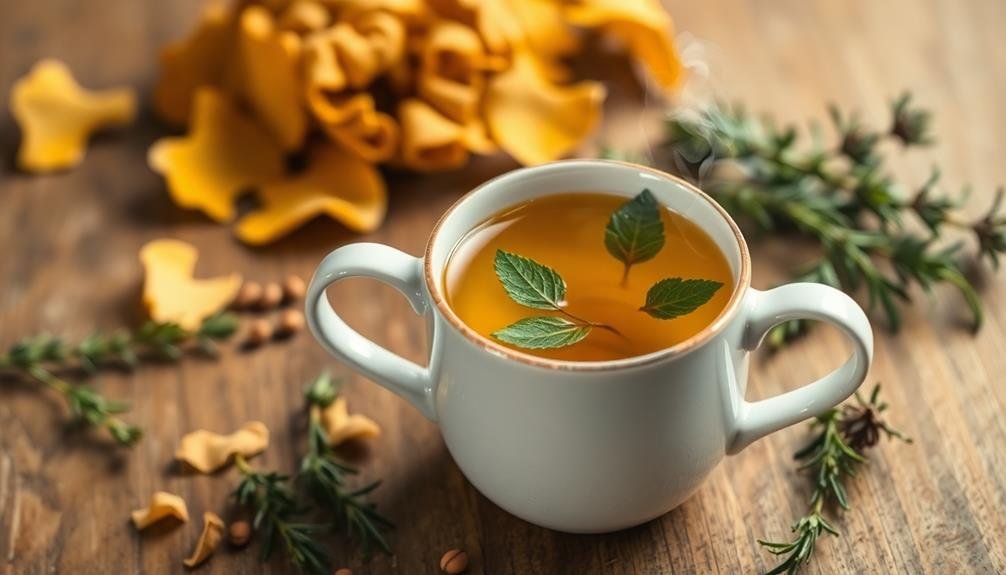
Ginkgo biloba and rosemary, two potent herbs, have long been associated with cognitive enhancement.
You'll find that ginkgo, derived from one of the oldest tree species on Earth, is renowned for its potential to improve blood circulation to the brain. This increased blood flow may enhance memory, concentration, and overall mental clarity. Ginkgo also contains powerful antioxidants that can protect your brain cells from damage caused by free radicals.
Rosemary, on the other hand, is an aromatic herb that's been linked to improved cognitive function and memory. It contains compounds like carnosic acid and rosmarinic acid, which have neuroprotective properties. These substances may help shield your brain from oxidative stress and inflammation, potentially slowing cognitive decline.
When combined, ginkgo and rosemary create a synergistic effect that may boost your brain power more effectively than either herb alone. Their complementary properties work together to enhance blood flow, protect neural tissues, and support overall cognitive function.
Historical Uses of Both Herbs

The historical uses of ginkgo and rosemary stretch back thousands of years, revealing a rich tapestry of medicinal applications across diverse cultures.
Ginkgo biloba, native to China, has been a staple in traditional Chinese medicine for over 5,000 years. It's been used to treat various ailments, including asthma, bronchitis, and cognitive disorders. Ancient texts describe its use for improving memory and mental clarity.
Rosemary, on the other hand, has its roots in the Mediterranean region. The ancient Greeks and Romans revered this herb for its ability to strengthen memory. They'd wear rosemary garlands during exams and important events. In medieval Europe, it was known as the "herb of remembrance" and often used in wedding ceremonies and funerals.
Both herbs have been used in folk medicine for circulatory issues. Ginkgo was believed to improve blood flow to the brain and extremities, while rosemary was used to stimulate blood flow and relieve muscle pain.
Throughout history, these herbs have been consumed as teas, tinctures, and powders, demonstrating their versatility and enduring popularity in traditional healing practices.
Active Compounds in Ginkgo
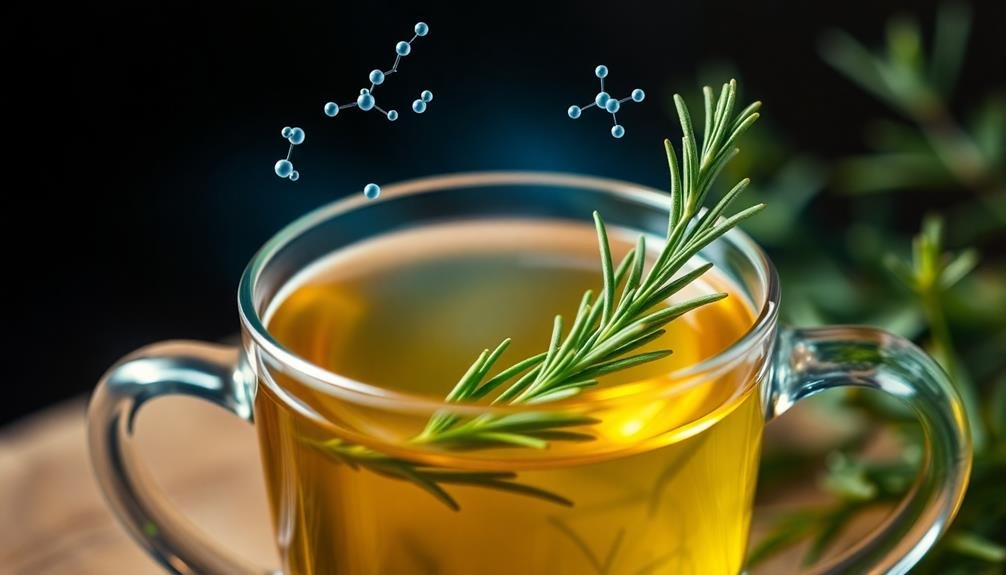
Nature's pharmacy within ginkgo's leaves contains a rich array of bioactive compounds. These potent substances work synergistically to enhance your cognitive function and overall brain health. The most notable compounds in ginkgo are flavonoids and terpenoids, each playing a unique role in boosting your mental acuity.
Flavonoids, particularly quercetin and kaempferol, act as powerful antioxidants. They protect your brain cells from oxidative stress and free radical damage, potentially slowing cognitive decline. Terpenoids, including ginkgolides and bilobalides, improve blood circulation to your brain, enhancing oxygen and nutrient delivery.
Here's a quick overview of ginkgo's key active compounds:
| Compound Type | Examples | Primary Benefits |
|---|---|---|
| Flavonoids | Quercetin, Kaempferol | Antioxidant protection |
| Terpenoids | Ginkgolides, Bilobalides | Improved circulation |
| Proanthocyanidins | Procyanidins | Anti-inflammatory |
These compounds work together to potentially improve your memory, focus, and cognitive processing speed. They may also help reduce anxiety and depression symptoms, contributing to better overall mental well-being. By incorporating ginkgo into your tea, you're tapping into nature's cognitive enhancer.
Rosemary's Cognitive-Enhancing Properties
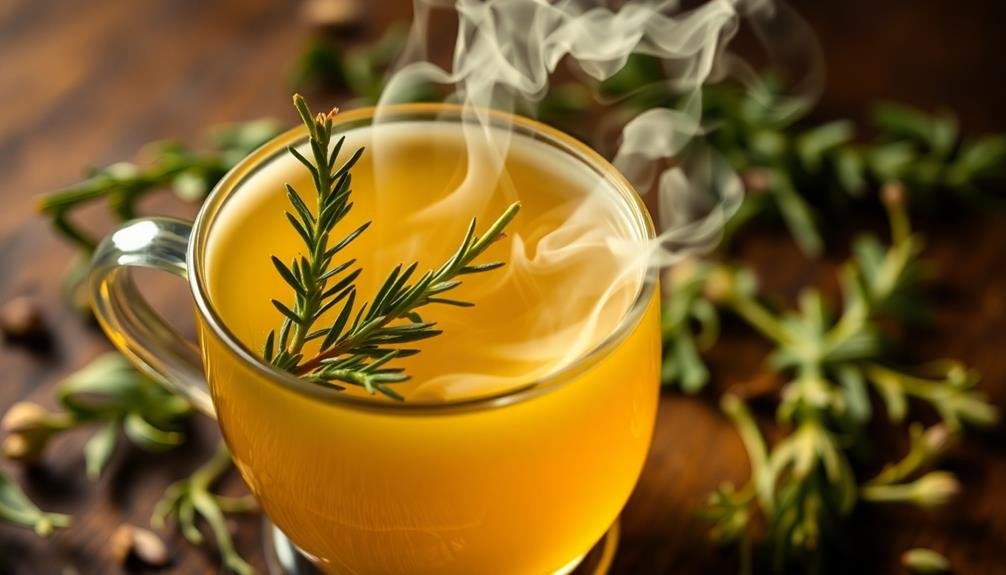
Numerous studies have shown rosemary's potential to enhance cognitive function. This aromatic herb contains several compounds that can boost your brain power, with rosmarinic acid and 1,8-cineole being the most notable. These compounds have been found to improve memory, increase alertness, and enhance overall cognitive performance.
When you consume rosemary, whether in tea or other forms, you're benefiting from its ability to increase blood flow to your brain. This improved circulation helps deliver more oxygen and nutrients to your brain cells, supporting their ideal function.
Additionally, rosemary acts as an antioxidant, protecting your brain from oxidative stress and inflammation, which can contribute to cognitive decline.
Research has also shown that rosemary can help improve your concentration and focus. It's been found to enhance your ability to retain information and recall it later, making it particularly useful for students or professionals who need to remember large amounts of data.
Furthermore, rosemary's cognitive-enhancing properties aren't limited to short-term effects; regular consumption may help protect against age-related cognitive decline and neurodegenerative diseases like Alzheimer's.
Synergistic Effects of Combining Herbs
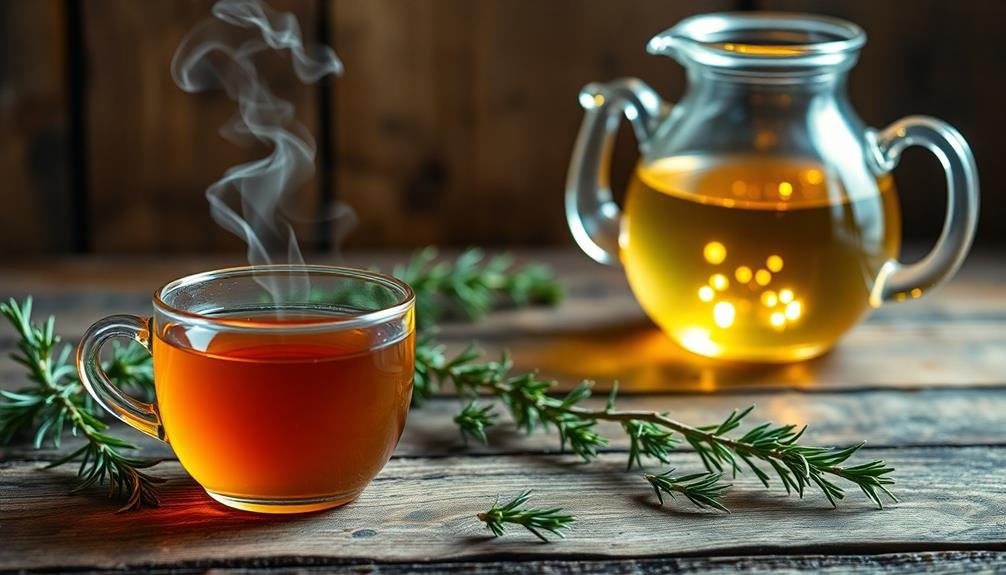
You'll find that combining certain herbs in your brain-boosting tea can create powerful synergistic effects.
By blending herbs like rosemary with others such as ginkgo biloba or lion's mane, you're likely to experience enhanced cognitive function beyond what each herb offers individually.
Additionally, you'll benefit from complementary antioxidant properties, as different herbs often contain unique compounds that work together to protect your brain cells more effectively.
Enhanced Cognitive Function
Over the centuries, herbalists have discovered that combining certain herbs can produce synergistic effects, amplifying their individual benefits for cognitive function. When you combine ginkgo and rosemary in a tea, you're tapping into this ancient wisdom.
Ginkgo biloba is known for improving blood flow to the brain, enhancing memory and concentration. Rosemary, on the other hand, contains compounds that boost alertness and mental clarity.
Together, these herbs create a powerful cognitive enhancer. The increased blood flow from ginkgo allows rosemary's active compounds to reach your brain more efficiently. You'll likely experience improved focus, enhanced memory recall, and greater mental stamina.
This combination may also help protect your brain cells from oxidative stress and age-related decline. Regular consumption of this brain-boosting tea can lead to long-term cognitive benefits.
You might notice improved problem-solving skills, faster information processing, and better multitasking abilities. It's essential to recognize that while these effects are supported by traditional use and some scientific studies, individual results may vary.
Consistency is key when incorporating this herbal blend into your daily routine for peak cognitive enhancement.
Complementary Antioxidant Properties
While the cognitive benefits of this herbal blend are impressive, its antioxidant properties shouldn't be overlooked. When you combine ginkgo and rosemary, you're creating a powerful antioxidant duo that can help protect your brain cells from oxidative stress and free radical damage.
Ginkgo biloba contains flavonoids and terpenoids, which are known for their strong antioxidant effects. Rosemary, on the other hand, is rich in carnosic acid and rosmarinic acid, both potent antioxidants. Together, these herbs create a synergistic effect that's greater than the sum of their individual parts.
The complementary antioxidant properties of ginkgo and rosemary offer several benefits:
- Enhanced neuroprotection against age-related cognitive decline
- Improved circulation to the brain, promoting better oxygen and nutrient delivery
- Reduced inflammation in the brain, which can contribute to cognitive issues
- Increased protection against oxidative stress-induced DNA damage
Brewing the Perfect Brain-Boosting Tea
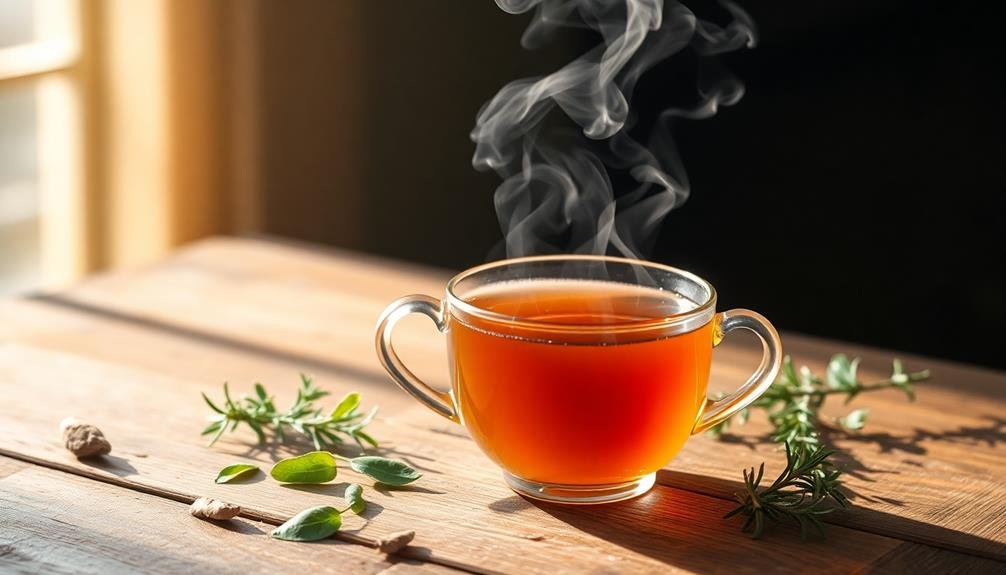
In light of the numerous benefits brain-boosting teas offer, it's crucial to brew them correctly to maximize their potential. To create the perfect ginkgo and rosemary brain-boosting tea, start with high-quality, organic ingredients. Use 1 teaspoon of dried ginkgo leaves and 1 teaspoon of dried rosemary per cup of water.
Bring fresh, filtered water to a near-boil (around 200°F or 93°C). Pour the hot water over the herbs in a tea infuser or teapot. Let the tea steep for 5-7 minutes to extract the beneficial compounds fully. Don't oversteep, as this can lead to a bitter taste.
Strain the tea and add a small amount of honey or lemon if desired, though it's best to enjoy it unsweetened to avoid unnecessary sugar intake. Sip the tea slowly, allowing yourself to fully experience its aroma and flavor.
For best results, drink this brain-boosting tea 1-2 times daily, preferably in the morning or early afternoon. Remember to be consistent with your tea routine, as the cognitive benefits tend to accumulate over time with regular consumption.
Recommended Dosage and Frequency
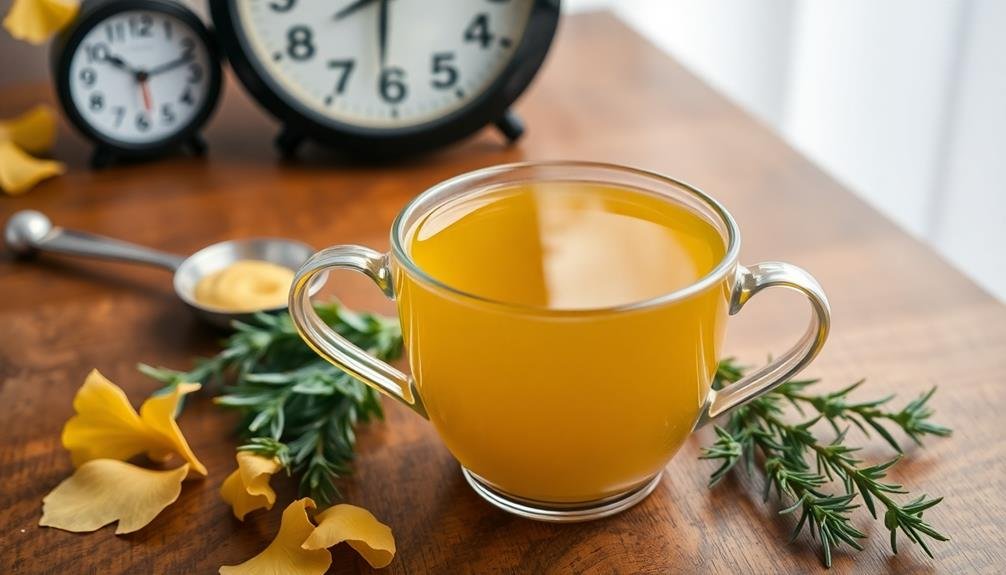
Now that you know how to brew the perfect brain-boosting tea, let's address the best dosage and frequency for consumption. While individual needs may vary, general guidelines can help you maximize the benefits of your ginkgo and rosemary tea.
For ideal results, consider the following recommendations:
- Start with one cup (8 ounces) of tea per day, preferably in the morning.
- Gradually increase to two cups daily, spacing them out between morning and early afternoon.
- Don't exceed three cups per day, as higher doses may lead to side effects.
- Maintain consistency by drinking the tea at least five days a week.
It's important to note that the effects of ginkgo and rosemary tea are cumulative, so you'll need to consume it regularly for several weeks to notice significant improvements in cognitive function.
If you're sensitive to caffeine, opt for decaffeinated versions or limit your intake to earlier in the day. As with any dietary supplement, it's wise to consult your healthcare provider before incorporating this tea into your routine, especially if you're pregnant, nursing, or taking medications.
Potential Side Effects and Precautions
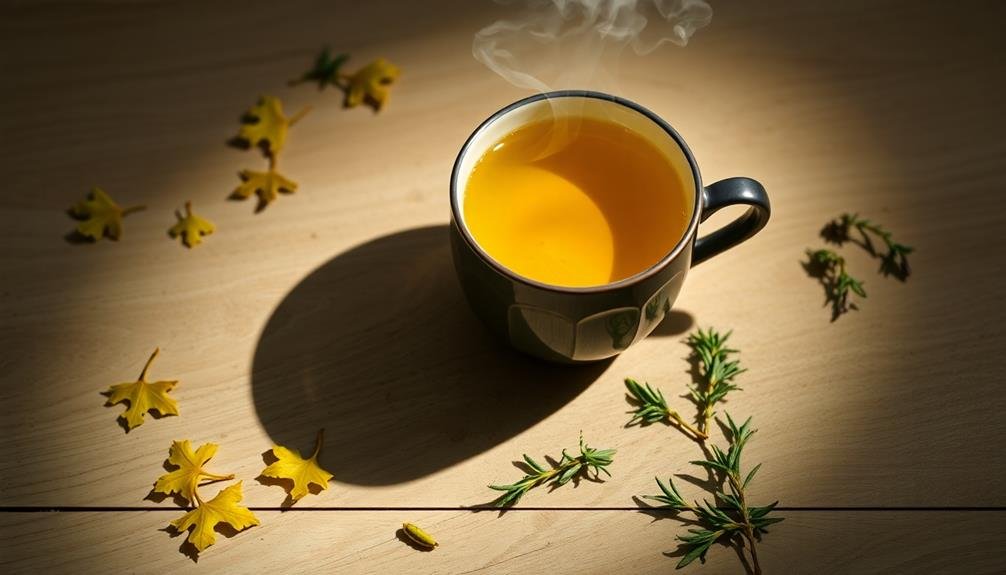
While brain-boosting teas can offer cognitive benefits, you should be aware of potential side effects.
You might experience adverse reactions such as headaches, insomnia, or digestive issues when consuming these teas.
It's essential to consult your healthcare provider before incorporating brain-boosting teas into your routine, especially if you're taking medications, as certain ingredients may interact with them.
Possible Adverse Reactions
Before diving into the brain-boosting benefits of tea, it's important to contemplate potential side effects and precautions. While ginkgo and rosemary are generally safe for most people, you should be aware of possible adverse reactions.
If you're considering adding this brain-boosting tea to your routine, keep these potential issues in mind:
- Allergic reactions: Some individuals may experience allergic responses to ginkgo or rosemary, including skin rashes, itching, or difficulty breathing.
- Blood thinning effects: Ginkgo can increase the risk of bleeding, especially if you're taking blood-thinning medications or have a bleeding disorder.
- Gastrointestinal distress: Both herbs may cause stomach upset, nausea, or diarrhea in some people, particularly when consumed in large quantities.
- Interactions with medications: Ginkgo and rosemary can interact with certain medications, including antidepressants, diabetes drugs, and seizure medications.
If you're pregnant, nursing, or have any pre-existing medical conditions, consult your healthcare provider before incorporating this tea into your diet.
It's always better to err on the side of caution when it comes to your health and well-being.
Medication Interactions Caution
When considering brain-boosting tea, it is crucial to be aware of potential medication interactions. Ginkgo and rosemary, the key ingredients in this tea, can interact with various medications, potentially altering their effectiveness or causing unwanted side effects.
If you're taking any of the following medications, consult your healthcare provider before consuming brain-boosting tea:
| Medication Type | Potential Interaction |
|---|---|
| Blood thinners | Increased bleeding risk |
| Antidepressants | Altered effectiveness |
| Diabetes drugs | Changes in blood sugar |
| Seizure medications | Reduced effectiveness |
Be particularly cautious if you're on warfarin, as ginkgo can increase its blood-thinning effects. Rosemary may interact with ACE inhibitors and diuretics, affecting blood pressure control. If you're scheduled for surgery, stop drinking this tea at least two weeks prior, as it can increase bleeding risk.
Scientific Studies on Cognitive Enhancement
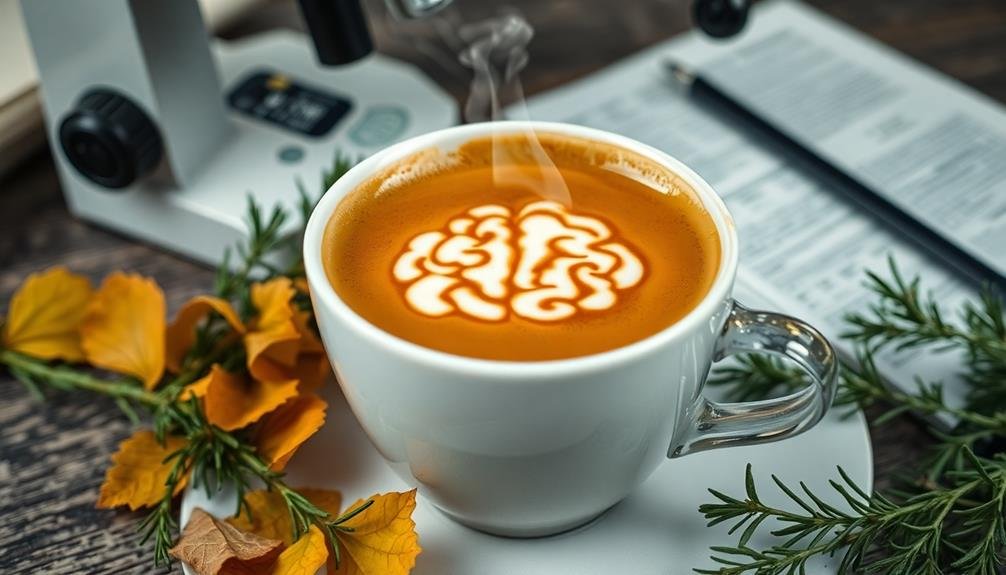
Over the past decade, researchers have intensified their focus on cognitive enhancement through natural means. You'll find a wealth of studies exploring the potential benefits of various herbs and compounds on brain function. Ginkgo biloba and rosemary, in particular, have garnered significant attention for their cognitive-boosting properties.
Scientific studies have shown promising results for both herbs:
- Memory improvement: Ginkgo has been found to enhance short-term and long-term memory in healthy adults and those with cognitive impairments.
- Increased focus: Rosemary's active compounds have demonstrated the ability to improve concentration and mental clarity.
- Neuroprotection: Both herbs contain antioxidants that may help protect brain cells from oxidative stress and age-related decline.
- Enhanced blood flow: Ginkgo has been shown to increase cerebral blood flow, potentially improving oxygen and nutrient delivery to the brain.
While these studies are encouraging, it's crucial to recognize that results can vary among individuals.
More research is needed to fully understand the mechanisms and long-term effects of these herbs on cognitive function.
As always, consult with a healthcare professional before incorporating new supplements into your routine.
Comparing to Other Brain-Boosting Teas
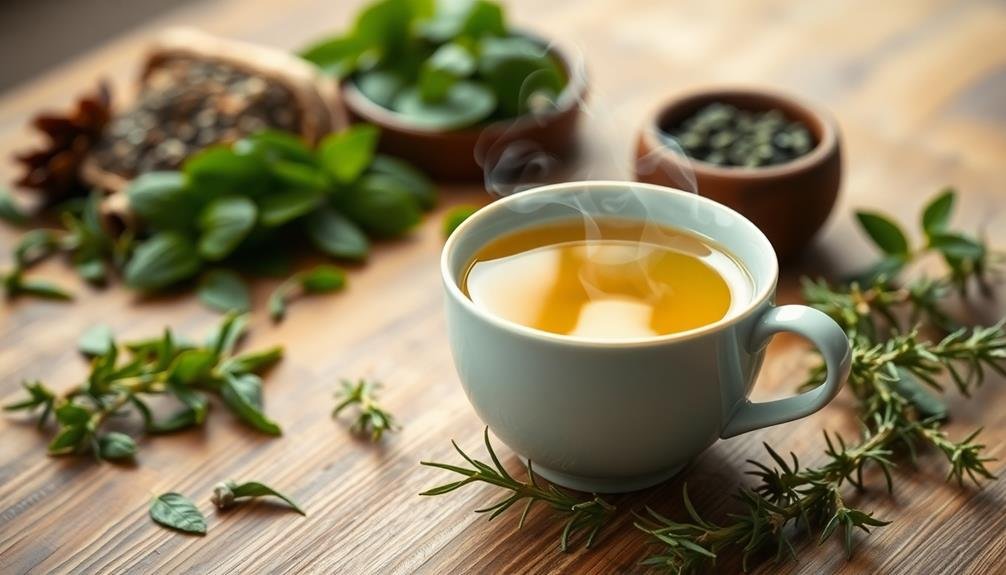
When you're looking for a brain-boosting tea, you'll find many options on the market.
Green tea and ginkgo-rosemary blends are two popular choices, each offering unique cognitive benefits.
You'll want to take into account the caffeine content of these teas, as it can vary considerably and impact your mental alertness and focus differently.
Green Tea vs. Ginkgo-Rosemary
Two popular contenders in the domain of brain-boosting teas are green tea and ginkgo-rosemary blends. While both offer cognitive benefits, they differ in their composition and effects.
Green tea contains caffeine and L-theanine, which work synergistically to improve focus and alertness. Ginkgo-rosemary tea, on the other hand, combines the memory-enhancing properties of ginkgo biloba with rosemary's ability to boost mental clarity.
When comparing these teas, consider the following:
- Antioxidant content: Green tea is rich in catechins, while ginkgo-rosemary provides flavonoids and terpenoids.
- Onset of effects: Green tea's caffeine offers quicker results, whereas ginkgo-rosemary's benefits build up over time.
- Duration: The effects of green tea last for a few hours, while ginkgo-rosemary's impact can be more long-lasting.
- Taste profile: Green tea has a light, grassy flavor, while ginkgo-rosemary offers a more complex, herbal taste.
Ultimately, your choice between green tea and ginkgo-rosemary depends on your specific needs and preferences.
You might even consider alternating between the two to reap the benefits of both in your brain-boosting routine.
Caffeine Content Comparison
Comparing the caffeine content of various brain-boosting teas reveals significant differences that can impact your cognitive enhancement experience.
While ginkgo-rosemary tea is naturally caffeine-free, green tea contains moderate amounts of caffeine, typically ranging from 25 to 35 mg per 8-ounce cup.
Black tea, another popular brain-booster, has higher caffeine levels, usually between 14 to 70 mg per cup.
If you're looking for a caffeine-free alternative, herbal teas like peppermint and chamomile offer cognitive benefits without the stimulant effects.
However, if you prefer a caffeinated option, matcha green tea provides a substantial boost with 70 mg of caffeine per cup.
It's worth noting that yerba mate, a South American tea known for its cognitive-enhancing properties, contains 85 mg of caffeine per cup.
When choosing a brain-boosting tea, consider your caffeine tolerance and desired effects.
Ginkgo-rosemary tea allows you to enjoy cognitive benefits without caffeine-induced jitters or sleep disruptions.
If you need an energy boost, green or black tea might be more suitable.
Remember that individual responses to caffeine vary, so it's important to listen to your body and adjust your tea consumption accordingly.
Flavor Profile and Taste Notes
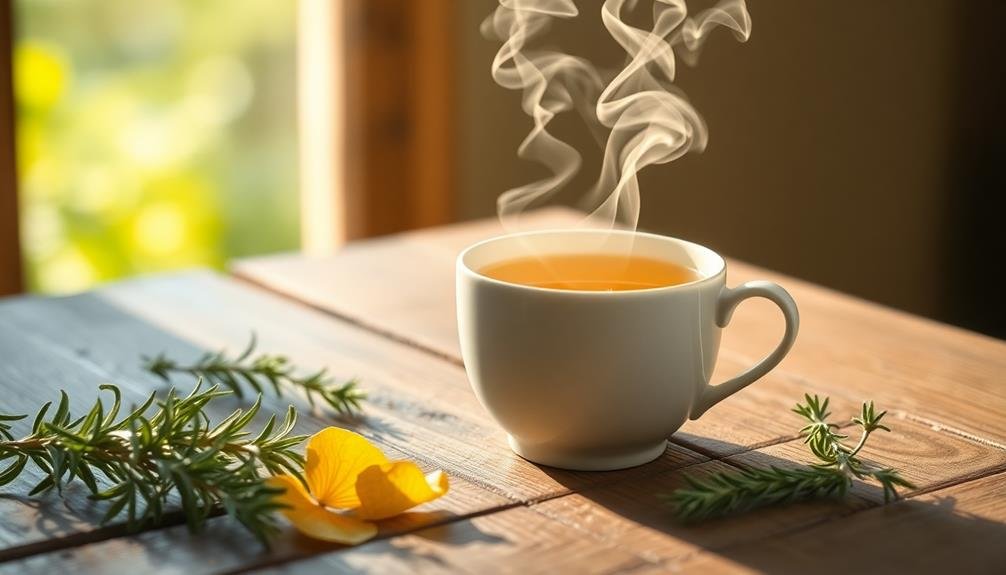
Although many people drink brain-boosting tea for its cognitive benefits, its flavor profile shouldn't be overlooked. When you sip a blend of ginkgo and rosemary tea, you'll notice a unique combination of tastes that complement each other beautifully.
The flavor profile of this brain-boosting tea can be broken down into four distinct notes:
- Earthy: Ginkgo contributes a subtle, earthy base that grounds the overall flavor.
- Herbal: Rosemary adds a prominent herbal note, reminiscent of pine and sage.
- Slightly bitter: Both ingredients have a mild bitterness that gives the tea depth.
- Minty: A surprising hint of mint-like coolness comes from the rosemary.
As you drink this tea, you'll first taste the herbal rosemary, followed by the earthy ginkgo. The slight bitterness lingers on your tongue, while the minty coolness refreshes your palate.
It's a complex yet balanced flavor that becomes more enjoyable with each sip. You can enhance the taste by adding a touch of honey or lemon, which will complement the herbal notes without overpowering the tea's natural flavors.
Incorporating Into Daily Routine

In light of its cognitive benefits and pleasant flavor profile, incorporating brain-boosting tea into your daily routine can be both enjoyable and beneficial. Start your day with a cup of ginkgo and rosemary tea to kickstart your mental focus and clarity. Brew a fresh batch in the morning and sip it while you prepare for work or tackle your to-do list.
Consider replacing your mid-morning coffee with this brain-boosting blend to avoid caffeine jitters while maintaining alertness. Keep a thermos of the tea at your desk for easy access throughout the day.
For an afternoon pick-me-up, brew another cup to combat the post-lunch slump and maintain productivity. You can also incorporate this tea into your evening routine to help wind down and promote relaxation.
However, be mindful of your individual sensitivity to herbs and adjust consumption accordingly. Aim for 2-3 cups daily to experience maximum benefits without overdoing it.
Remember to stay consistent with your intake, as the effects of ginkgo and rosemary tend to build up over time. By making this brain-boosting tea a regular part of your routine, you'll be nurturing your cognitive health while enjoying a flavorful beverage.
Long-Term Benefits for Brain Health
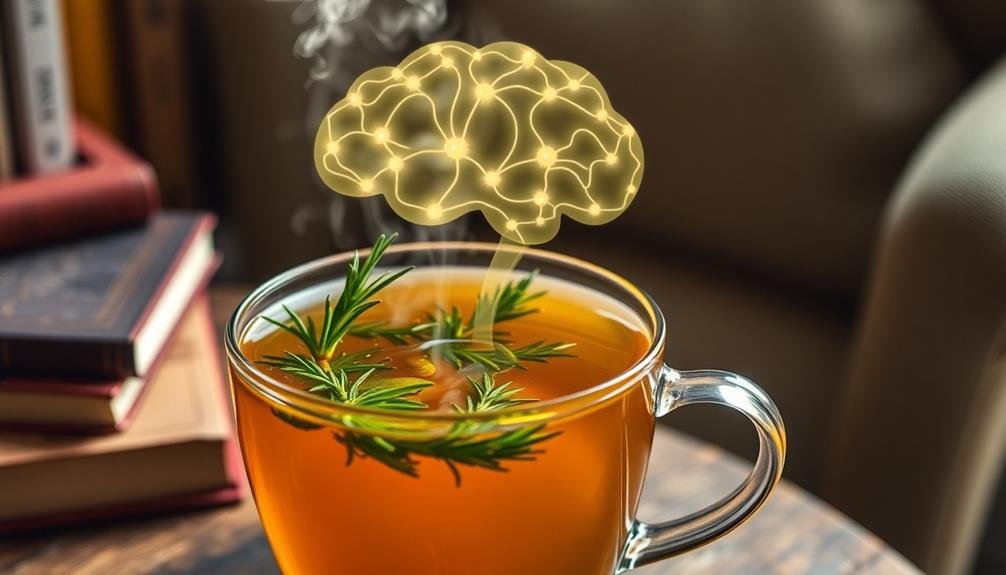
You'll experience improved cognitive function as a regular tea drinker, with enhanced mental clarity and focus becoming noticeable over time.
The neuroprotective properties in many teas can help shield your brain from age-related decline and neurodegenerative diseases.
Additionally, you'll likely find your memory sharpening, as certain teas have been shown to boost recall and retention abilities.
Improved Cognitive Function
Regular consumption of brain-boosting tea can yield long-term benefits for cognitive function. As you incorporate ginkgo and rosemary tea into your daily routine, you'll likely notice improvements in various aspects of your mental performance.
These herbs work synergistically to enhance your brain's capabilities, potentially leading to:
- Sharper memory retention
- Increased focus and concentration
- Enhanced problem-solving skills
- Faster information processing
You'll find that your ability to recall information, both short-term and long-term, improves considerably. Tasks that once seemed challenging may become easier as your brain's efficiency increases.
You'll also notice a boost in your ability to stay focused for extended periods, allowing you to tackle complex projects with greater ease.
The antioxidants in ginkgo and rosemary help protect your brain cells from damage, potentially slowing cognitive decline associated with aging.
Neuroprotective Properties
Beyond immediate cognitive enhancements, brain-boosting tea offers significant neuroprotective benefits that safeguard your brain's long-term health.
Ginkgo biloba and rosemary, two key ingredients in this potent blend, contain powerful antioxidants that combat oxidative stress and reduce inflammation in your brain. These compounds help protect your neurons from damage caused by free radicals, potentially slowing age-related cognitive decline.
Ginkgo's flavonoids and terpenoids have been shown to improve blood flow to the brain, enhancing oxygen and nutrient delivery to your brain cells. This increased circulation may help prevent neurodegenerative diseases like Alzheimer's and Parkinson's.
Rosemary's active component, carnosic acid, has demonstrated neuroprotective properties by activating a defense mechanism in brain cells. This mechanism helps shield your neurons from damage and may even stimulate the growth of new brain cells.
Regular consumption of this brain-boosting tea can contribute to maintaining cognitive function as you age, potentially reducing your risk of memory loss and other age-related brain disorders.
Memory Enhancement Effects
One of the most remarkable long-term benefits of brain-boosting tea is its potential to enhance memory function.
Regular consumption of ginkgo and rosemary tea can considerably improve your cognitive abilities, particularly in the domain of memory retention and recall. These herbs work synergistically to boost brain health and provide lasting effects that you'll appreciate as you age.
Here's how this powerful tea combination can enhance your memory over time:
- Increased blood flow to the brain, delivering more oxygen and nutrients to support ideal cognitive function
- Enhanced production of neurotransmitters, improving communication between brain cells
- Reduced inflammation and oxidative stress, protecting brain cells from damage
- Stimulated growth of new neural connections, promoting brain plasticity and adaptability
Sourcing Quality Ginkgo and Rosemary
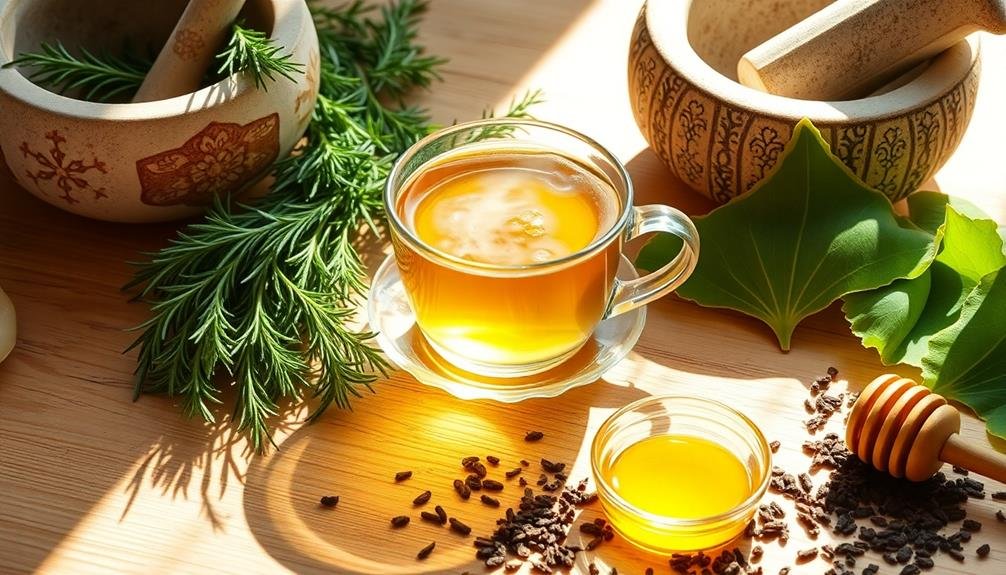
For ideal brain-boosting benefits, sourcing high-quality ginkgo and rosemary is crucial. When selecting ginkgo, look for standardized extracts containing 24% flavone glycosides and 6% terpene lactones. These compounds are responsible for ginkgo's cognitive-enhancing effects.
Opt for reputable brands that undergo third-party testing to ascertain purity and potency.
For rosemary, you'll want to choose organic, fresh herbs whenever possible. If using dried rosemary, confirm it's still aromatic and hasn't lost its potency. Look for bright green needles without any signs of discoloration or mold.
Alternatively, you can grow your own rosemary plant at home, guaranteeing a fresh supply for your brain-boosting tea.
When purchasing tea blends containing ginkgo and rosemary, check the ingredient list to verify the presence of both herbs in sufficient quantities. Avoid blends with artificial additives or fillers.
If you're making your own tea, use loose-leaf ginkgo and whole rosemary sprigs for the best flavor and potency. Steep the herbs in hot water for 5-10 minutes to extract their beneficial compounds fully.
Frequently Asked Questions
Can Pregnant Women Safely Drink Ginkgo and Rosemary Tea?
You shouldn't drink ginkgo and rosemary tea while pregnant. It's best to avoid these herbs as they may affect blood clotting and uterine contractions. Always consult your healthcare provider before consuming any herbal teas during pregnancy.
How Does This Tea Compare to Coffee for Mental Alertness?
You'll find ginkgo and rosemary tea offers a gentler, sustained mental boost compared to coffee's quick jolt. It enhances focus and memory without the jitters or crash. You're likely to feel more alert and clear-headed throughout the day.
Is the Tea Effective for Treating Specific Neurological Conditions?
While ginkgo and rosemary tea may offer some brain benefits, it's not a proven treatment for specific neurological conditions. You shouldn't rely on it as a cure. Always consult your doctor for proper diagnosis and treatment of neurological issues.
Can Children Benefit From Drinking Ginkgo and Rosemary Tea?
You shouldn't give ginkgo and rosemary tea to children without consulting a doctor. It's not typically recommended for kids due to potential side effects. Stick to age-appropriate, caffeine-free herbal teas that are safe for children.
Does the Tea Interact With Common Medications for Depression or Anxiety?
You should be cautious about drinking ginkgo and rosemary tea if you're taking medications for depression or anxiety. It's possible these herbs could interact with your meds. Always consult your doctor before mixing herbal teas with prescription drugs.
In Summary
You've discovered a powerful brain-boosting duo in ginkgo and rosemary tea. By combining these herbs, you're harnessing centuries of traditional wisdom and modern scientific backing. Remember, consistency is key. Make this tea a part of your daily routine to potentially improve memory, focus, and overall cognitive function. While it's not a miracle cure, it's a tasty and natural way to support your brain health. Give it a try and see how you feel!

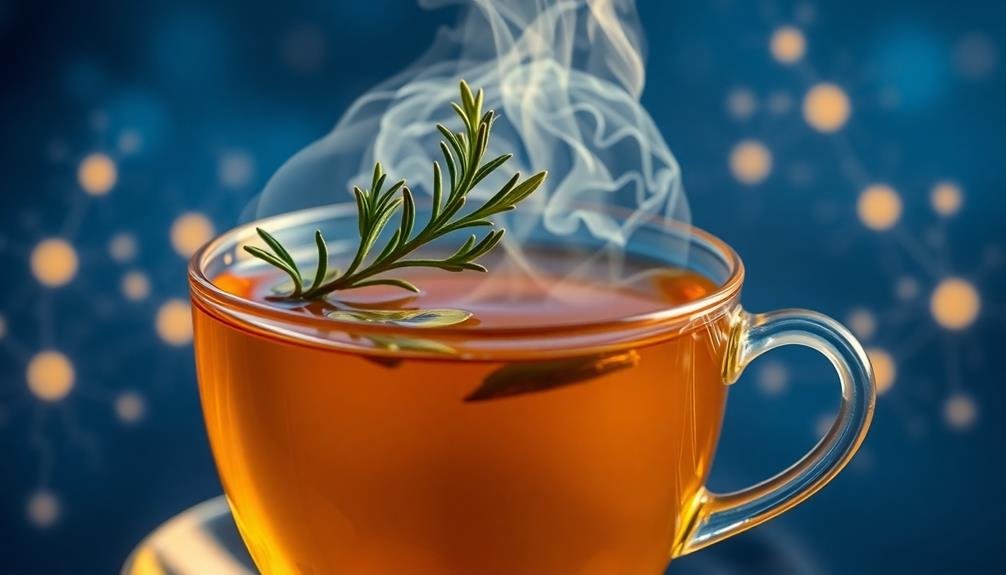


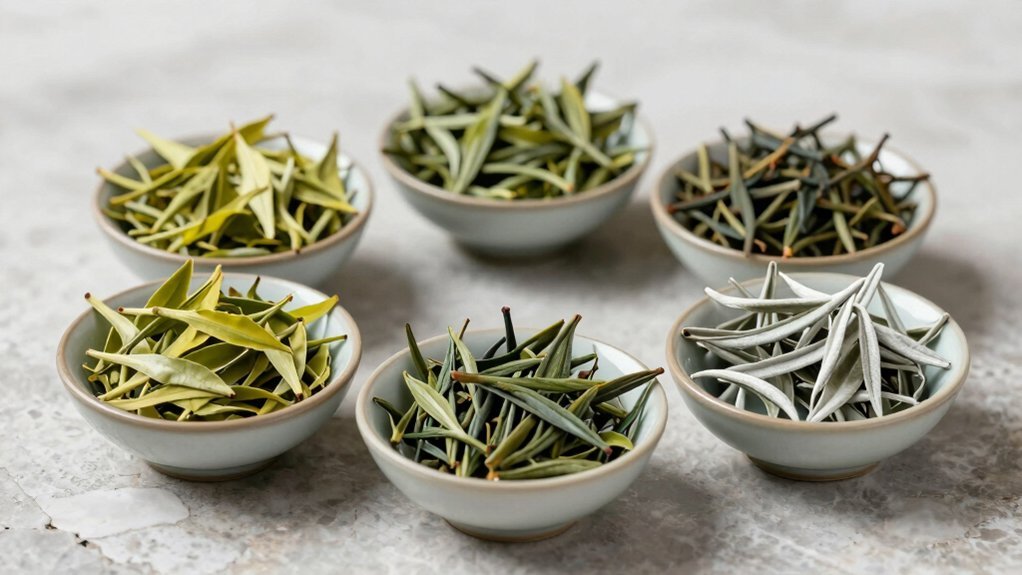
Leave a Reply